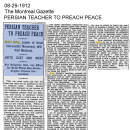Main menu
- ‘Abdu’l-Bahá’s Journey
- World Peace
- Stopping Racism in America
- Empowerment of Women
- More Principles...
- Prayer for America
Persian Teacher to Preach Peace
‘Abdu’l-Bahá, Leader of Great Universalist Movement, Will Visit Montreal.
UNITE EAST AND WEST
Not Religious Cult, but Effort for Good Which Has Grown Despite Persian Persecution.
That war must cease and that the time has come for all mankind to live in religious unity. Orient joining hands with Occident, is the burden of the message of ‘Abdu’l-Bahá, a venerable religious teacher from the East, who will arrive in Montreal within a day or two for a week’s stay in the city. He has been to London and Paris and has just concluded a mission to the United States. While in Montreal he will stay at 716 Pine avenue west, where visitors interested in his movement will be made welcome. During his stay here he will address a number of public meetings.
‘Abdu’l-Bahá, who is 68 years old, is the centre of the Bahá’í movement, with a following in Persia, his native country, of three million people, while many thousands of others are to be found in India, Egypt and Turkey. According to Prof. Edward Granville Browne, of the University of Cambridge, about thirty thousand Bahá’ís have suffered martyrdom in Persia alone.
The Bahá’í movement originated in Persia about seventy years ago, when a young man named Mohammed Ali, who became known as “the Báb,” or “The Gate,” arose to preach a spiritual religion in contradiction to the gross superstitions of his time, and to announce the coming of a great teacher whose appearance would mean the dawn of a new age of peace and brotherhood. He suffered imprisonment and martyrdom, but not before he had gained many followers. A storm of persecution followed, in the deeds of which a great teacher appeared in the person of Bahá’u’lláh, a Persian of princely lineage, who united the scattered Bahá’ís and began a mission which resulted in the conversion of one-third of Persia. “I have come,” he said, “to unite all the faiths and peoples of the world into one. These ruinous wars, these fruitless stripes, must cease. Let not a man glory in this, that he loves his country; but let him glory in this that he loves his kind.”
Bahá’u’lláh’s teaching aroused all the fanaticism of the Mohammedan Mullahs, and at their instigation the Persian and Turkish authorities tried by persecution and massacre to suppress the movement. The teacher and his immediate followers were exited and imprisoned, and at Acca, in Syria, Bahá’u’lláh died, in 1892, at the age of 75.
‘Abdu’l-Bahá, his son, who is now to visit Montreal, then succeeded to the leadership of the movement. Most of his life has been spent in captivity at Acca, and he knows what it is to languish in a dungeon and in chains. His release came in 1908, when the Young Turks drove Sultan ‘Abdul Hamid from the throne of Turkey. In the meantime, the movement had spread throughout the Near East.
Not Religious Cult
It is explained that Bahá’ísm is not a cult, as it has neither clergy nor ritual, but a movement for religious unity and brotherhood, aiming especially to unite the East and the West. The East, it is pointed out, needs what is best in material civilization of the West, while the West needs the spiritual civilization attained in the East. With the blending of the two, a greater civilization than the world has yet known will arise.
No one is asked to leave his own faith to become a Bahá’í, but all people are urged to recognize the fundamental truths underlying all religious mental truths underlying all religions and to live in spiritual unity with people of all faiths and races. Above all, the abolition of war is insisted upon. True national greatness, says ‘Abdu’l-Bahá, is not to be attained by means of dreadnoughts and murderous weapons, but by the doing of justice by nations and by individuals. The western world is reminded by this teacher from the East that it has forgotten to apply to gospel of “His Highness the Christ.” The Saviour meant it to be a law of lye, but we have turned it into a theory; and now ‘Abdul tells us we must go back to the original intention, put up our swords and dwell in peace with the nations the world over. Such in brief is the Bahá’í message.









